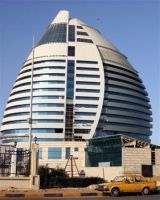As Darfur deteriorates, Sudan’s economy booms
Dec 13, 2006 (KHARTOUM) — New office blocks are popping up across the capital, and the country’s first shopping mall is packed. Nearby, cell phone and computer stores line city streets that just a few years ago were unpaved.
 Sudan is enjoying an oil-fueled economic boom even as its wartorn Darfur region suffers through brutal violence. Some here call the boom a hopeful sign that this famine-prone African country is pulling itself together.
Sudan is enjoying an oil-fueled economic boom even as its wartorn Darfur region suffers through brutal violence. Some here call the boom a hopeful sign that this famine-prone African country is pulling itself together.
Others, however, fear the new affluence could give Sudan’s government powerful leeway to brush off the threat of sanctions from the West, which so far has found no leverage to get Khartoum to allow U.N. peacekeepers into Darfur.
U.S. and European companies are largely shunning Sudan, but countries in Asia and the Mideast like China, Saudi Arabia and Libya have heavily invested. That could have wide political ramifications on the effort to help Darfur.
“The only effective pressure would be sanctions that would pinch targeted officials,” like those believed to have shares in government-controlled oil companies, said Colin Thomas-Jensen of the International Crisis Group think tank.
Sudan sends over two-thirds of its oil exports to China, for example, which relies on the country for about five percent of the oil it uses. Because of that economic relationship, China — which has a veto in the U.N. Security Council — is widely viewed as unlikely to ever allow new sanctions against Sudan that would cut off that strategic resource.
Nevertheless, many here still worry that sanctions could hurt their new prosperity.
“A better economy benefits everybody,” said Abdul Rahim Hamdi, a former finance minister who created the country’s booming stock exchange and still advises the government on economic matters.
“I hope the U.S. understands that, rather than penalize all the Sudanese people,” he said in a recent interview.
Overall, Sudan’s government is expected to earn between US$ 4 billion and US$ 5 billion this year in oil revenue, Hamdi said, or more than half the entire government income.
That, coupled with rigorous economic reform, has brought Sudan’s average per-capita income to nearly US$ 700 a year, although actual income varies widely between wealthy in the capital and Darfur refugees, for example, who have no income at all and survive solely on international aid.
The economy is growing by 12 percent, the International Monetary Fund says, and over US$2.3 billion in direct foreign investment poured in last year.
“Broadly speaking, this country’s economy is well managed,” said IMF country delegate Wabel Abdallah.
But the boom isn’t pleasing everybody.
“All the oil money is going to the government and its allies,” said Jubara Hamed, a former army officer who now drives a taxi, as he sat amid old minivans and flashy new SUVs on a four-lane highway that did not exist two years ago.
That is echoed by many Sudanese in Khartoum, and others spread across the country. The government of President Omar al-Bashir faces three separate rebel movements in the east, south and west Darfur region — all demanding more wealth-sharing as a key condition to sign peace deals.
The government denies the money goes only to the elite.
Hamdi said nearly a third of Sudan’s economy is driven by government spending, including a new health care system, thousands of miles of roads and new universities. He also contended that agriculture and a boom in services, not just oil, are driving the economy.
But oil is key.
Sudan’s estimated oil reserve of 1.6 billion barrels was first discovered in the 1970s and seriously exploited by the late 1990s. Despite the oil, economic growth was complicated by international sanctions, Hamdi said.
Sudan had U.N. sanctions placed against it in the 1990s because it hosted al-Qaida and other terror groups, but the economic measures were lifted in reward for its help against terrorism after the Sept 11, 2001, attacks.
The United States later re-imposed its own economic sanctions as a civil war dragged on in the south. The U.S. measures were recently strengthened because of the Sudanese government’s suspected role in Darfur, where three years of rebellion and brutal counterinsurgency have killed more than 200,000 people.
Darfur’s suffering seems a world away from the trading floor of the booming stock exchange in Khartoum, where brokers on a recent morning excitedly took orders on their cell phones.
“We aren’t the biggest exchange in the world,” said general manager Isam Elzein Elmahi. “But we certainly have the fastest-growing business sector in Africa or the Mideast.”
In his office high in one of Khartoum’s largest office towers, Elmahi — a Chicago-trained economist who sports a pinstriped suit and diamond-fitted watch — hopes the government will next privatize part of its majority stake in the oil industry.
“We think the oil companies can drive our market much further up,” he said.
(AP)
